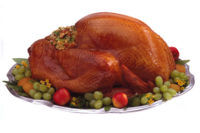The turkey industry faces growing economic problems, fueled by the terrible drought in the Midwest and a misguided federal ethanol policy that is turning a feed shortage into an acute feed crisis. This summer’s drought is one of the worst in history, reducing corn yields to their lowest levels in a generation and diminishing the feed value of the remaining corn. With this much damaged or destroyed corn, supplies tighten naturally and prices increase, making it increasingly expensive to feed turkeys and all livestock and poultry.
It is a situation in which one would expect the federal government to be looking for a way to help ease the grain shortage and keep food prices under control. But, so far, the government has “doubled-down” on the crisis by refusing to ease the ethanol-production mandate imposed by the Renewable Fuel Standard (RFS). The RFS is the program created by Congress in 2005 and expanded in 2007 that requires a specific amount of renewable fuel (13.2 billion gallons in 2012) to be blended into gasoline. Since virtually all renewable fuel in this country is corn-based ethanol, the RFS is now diverting more than 40 percent of the U.S. corn crop to ethanol production. It continues to be the top obstacle to growth and productivity for the turkey industry.
The National Turkey Federation (NTF) has been active in Washington since 2004 in fighting for a more responsible renewable fuels policy. Currently, NTF is one of the organizations leading the effort to convince EPA to waive all or a substantial portion of the RFS. Grassroots efforts have led to eight governors, 156 U.S. representatives, 34 U.S. Senators, and scores of poultry and livestock producers to ask EPA Administrator Lisa Jackson to grant a waiver. In response to all these efforts, and specifically to petitions from Arkansas and North Carolina, EPA has opened a comment period (set to close on Oct. 11) on a possible waiver.
Additionally, NTF is working in numerous coalitions, the most recent being Smarter Fuel Future, which is voicing their concern along with other organizations about the negative effects of the RFS. This group will build on earlier efforts and expand awareness of the economic, environmental, hunger and engine-performance implications of current U.S. biofuels policy and further unite the voices urging Congress and the administration to revisit the failed RFS.
The turkey industry understands and supports the need to develop domestic sources of energy, but an adequate feed supply is a crucial priority. Food and energy should never be forced by government mandates to compete with each other for key inputs.
Exports
Turkey had another great year in exports. According to USDA, turkey product shipments have been steady throughout the first half of 2012, with exports totaling 366 million pounds. The top three export markets for U.S. turkey meat were Mexico, Hong Kong and China.
Interestingly, other export markets grew even faster in the first half of the year than Mexico, but at 198 million pounds, it still accounted for 54 percent of the total.
In June, turkey exports totaled 58.7 million pounds, 9.5 percent higher than in June 2012.
Boneless dark meat remains the top turkey product being exported, which is important to the turkey industry’s economic health, because domestic dark meat sales have slowed in 2012, in part because of a backlog of dark meat that began to build in the latter part of last year.
The entire market picture, domestic and export, could change in 2013 — if USDA is correct in forecasting a decline in all livestock and poultry production.
Production
The latest USDA forecast for U.S. turkey meat production in 2013 was reduced by 135 million pounds to 5.8 billion pounds of ready-to-cook turkey meat, a decline of 2.7 percent from expected 2012 production. This is again related to the RFS, the drought and the increased prices that come with the higher cost of corn. Another complicating factor is the uncertainty about how much of the cost increase the industry’s customers and end consumers can absorb. Turkey meat production during the first six months of 2012 was 2.9 billion pounds, 2.7 percent higher than in the same period in 2011.The forecast for turkey meatproduction in the second half of 2012 is 3 billion pounds, up 3 percent from the same period in 2011. The turkey industry will have to adjust to these new economic realities.
Technical and regulatory
The turkey industry (through NTF), has continued to develop action-based plans on Salmonella based on its groundbreaking Ground Turkey Summit of 2011. NTF members are implementing aggressive plans of additional pathogen-reduction activities, including the immediate reassessment of HACCP plans for Salmonella control measures and, where appropriate, the adjustment of pathogen-control programs and HACCP plans.
In other activities, the turkey industry continues reviewing progress in decreasing Salmonella in live birds. The turkey industry has spent millions of dollars on the research and development of a Salmonella-free breeding stock and is researching how to better understand if more can be done to lower Salmonella levels on farms.
In 2012, significant efforts have gone into better communications with CDC and USDA regarding epidemiological investigations of foodborne illness outbreaks. An ongoing dialogue between NTF and FSIS and CDC has led to increased transparency and more timely communication, including expedited information sharing at the outset of any abnormal illness pattern, which will allow turkey plants to review records more quickly and respond accordingly to ensure that the epidemiological investigations reach a correct conclusion.
Also, turkey companies continue to implement additional interventions, including high-pressure pasteurization (HPP), to further decrease the presence of Salmonella in ground products.
Public relations
For 2012, NTF focused on one of its fastest growing products, ground turkey. NTF worked to highlight ground turkey in three major ways.
Throughout June, Turkey Lovers Month, NTF promoted ground turkey. Mark Bucher, founder and executive chef of the award-winning restaurant company: BGR: The Burger Joint, created the Ultimate Turkey Burger to provide a flavorful, healthy meal. Bucher was filmed making his Ultimate Turkey Burger, and was aired around the country as a multimedia press release, promoting ground turkey as the healthy option.
For the second activity, Sara O’Donnell, food blogger and creator of Average Betty, showed viewers how to create a simple, but tasty “Man Loaf” using ground turkey. The video was viewed more than 11,000 times.
Finally, NTF has effectively utilized social media, including Facebook, Twitter and Pinterest to increase its visibility.



Report Abusive Comment